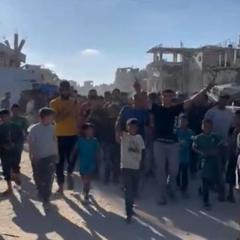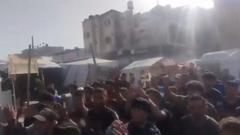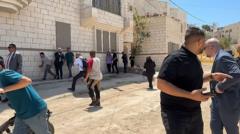As anger mounts over the conduct of the war in Gaza, a significant portion of the Israeli public expresses a desire for peace, leading to increasing anti-war protests and critical remarks from former military leaders.**
Israeli Sentiment Shifts Amidst Growing Anti-War Protests**

Israeli Sentiment Shifts Amidst Growing Anti-War Protests**
A rising tide of dissent within Israel highlights a growing opposition to the ongoing conflict in Gaza, with significant calls for peace and humanitarian considerations.**
As the conflict in Gaza escalates, the atmosphere in Israel has begun to shift dramatically, with a notable rise in anti-war sentiments and protests advocating for peace. Prominent figures, including Yair Golan, a left-wing politician and ex-IDF deputy commander, have voiced their concerns, warning that Israel risks international isolation if it continues its current military approach. "If we don’t return to acting like a sane country, Israel will become a pariah state, akin to South Africa," he remarked during a radio interview, calling for a reconsideration of strategies that result in civilian casualties.
Prime Minister Benjamin Netanyahu responded angrily, labeling Golan's statement as "blood libel." However, discontent has seeped into other levels of Israeli leadership. Moshe "Bogi" Ya'alon, the former defence minister, described the situation as a destructive government policy rather than an unintentional consequence of war.
Public sentiment appears to be resonating with calls for an end to hostilities. A recent survey revealed that 61% of Israelis favored concluding the war and prioritizing the return of hostages, while only 25% supported the continuation of military operations in Gaza. The government maintains its stance of completely dismantling Hamas and securing the safe return of hostages, with Netanyahu promising "total victory."
Despite the efforts of the government, a sense of hopelessness pervades many Israeli citizens. Gershon Baskin, who previously negotiated hostage releases, remarked on the overwhelming desire among victim families for peace. The recent proliferation of protests has brought together many Israelis advocating for an end to the fight. Recently, around 500 demonstrators marched towards the Gaza border carrying poignant placards, illustrating the human cost of the war, and calling for a ceasefire.
The protests have led to confrontations, including the arrest of Standing Together's leader Alon-Lee Green for attempting to block a road, while those detaining him faced their own controversies. Multiple soldiers and reservists have publicly urged for focus on negotiations over warfare, reflecting a broader concern for the safety of both soldiers and civilians.
Yet, opinions diverge. Some Israelis maintain a hardline perspective, viewing all in Gaza as complicit with militant groups. Meanwhile, international responses have intensified, with the UK, France, and Canada voicing strong concern over Israel’s military actions, hinting at potential sanctions and trade deal suspensions if the humanitarian crisis worsens.
With increasing pressure both domestically and from abroad, activists like Uri Weltmann express optimism: "There’s an awakening happening within the Israeli populace," suggesting that the tide may be turning against the familiar narratives of war.



















